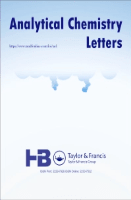
Analytical Chemistry Letters
Scope & Guideline
Empowering Researchers with Cutting-Edge Findings
Introduction
Aims and Scopes
- Analytical Method Development and Validation:
The journal emphasizes the creation and validation of robust analytical methods, particularly using chromatographic techniques like HPLC, UPLC, and HPTLC, to ensure accuracy and reliability in chemical analysis. - Application of Quality by Design (QbD) Principles:
A consistent focus on QbD principles is evident, aiming to enhance the reliability of analytical methods through systematic design and optimization, ensuring methods are not only effective but also efficient. - Green Chemistry and Sustainable Practices:
The journal promotes research that incorporates green chemistry principles, emphasizing eco-friendly methodologies and the development of sustainable analytical techniques. - Multidisciplinary Research:
Research published in the journal spans various fields including pharmaceuticals, environmental science, and materials science, showcasing the interdisciplinary nature of analytical chemistry. - Biological and Pharmaceutical Applications:
A significant portion of the research focuses on the pharmaceutical applications of analytical methods, including the analysis of drug formulations and the study of biological materials.
Trending and Emerging
- Eco-friendly and Sustainable Analytical Methods:
There is a significant increase in research focusing on eco-friendly and sustainable methodologies, aligning with global initiatives for environmental protection and sustainability in chemical practices. - Integration of Advanced Analytical Techniques:
Emerging trends include the integration of advanced techniques such as mass spectrometry (MS) and chromatographic methods, highlighting the importance of multi-faceted approaches in analytical chemistry. - Pharmaceutical and Biomedical Applications:
A growing emphasis on pharmaceutical and biomedical applications is evident, particularly in the development of methods for drug analysis and the study of biological samples, reflecting the importance of healthcare-related research. - Nanotechnology in Analytical Chemistry:
The incorporation of nanotechnology into analytical methods is on the rise, with research exploring the use of nanomaterials for enhanced detection and analysis capabilities. - Data-Driven Approaches and Chemometrics:
There is an increasing trend towards the use of data-driven approaches and chemometric methods to optimize analytical processes and improve the interpretation of complex data sets.
Declining or Waning
- Traditional Spectrometric Techniques:
There is a noticeable decline in the publication of papers focused solely on traditional spectrometric techniques, such as UV-Vis and basic fluorescence methods, as researchers increasingly favor more advanced and integrated analytical approaches. - Basic Environmental Analysis:
Research centered on basic environmental analysis methods, without the incorporation of advanced techniques or green chemistry principles, is becoming less common, as the field shifts toward more innovative and sustainable practices. - Single-Method Analytical Approaches:
There is a reduction in studies that rely on single-method analytical approaches, as multi-method strategies and integrated techniques become more favored for comprehensive analysis.
Similar Journals
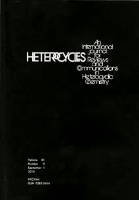
HETEROCYCLES
Fostering Scholarly Excellence in Chemistry ResearchHETEROCYCLES, published by the Japan Institute of Heterocyclic Chemistry, stands as a pivotal journal within the fields of Analytical Chemistry, Organic Chemistry, and Pharmacology. With its ISSN 0385-5414 and E-ISSN 1881-0942, HETEROCYCLES has been a respected platform for scholarly work since its establishment in 1983, featuring innovative research up until 2022. While currently not open access, the journal is renowned for its rigorous peer-review process, ensuring the dissemination of high-quality research. Despite its Q4 ranking in the 2023 quartiles for its categories, it plays a crucial role in bridging gaps in knowledge and advancing the discourse on heterocyclic compounds, which are vital in drug discovery and development. Researchers, professionals, and students who are engaged in chemistry and pharmacology will find HETEROCYCLES an essential source of cutting-edge studies, insights, and an opportunity to contribute to the evolving landscape of these scientific fields.
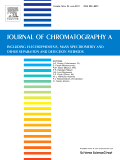
JOURNAL OF CHROMATOGRAPHY A
Connecting Researchers with Cutting-edge DiscoveriesJOURNAL OF CHROMATOGRAPHY A, published by Elsevier, is a leading journal in the disciplines of Analytical Chemistry, Biochemistry, and Organic Chemistry, boasting an impressive 2023 Q2 categorization across multiple fields. With an ISSN of 0021-9673 and an E-ISSN of 1873-3778, this prestigious journal has been at the forefront of chromatography research since its inception in 1958. The journal serves as a vital platform for disseminating high-quality research articles, reviews, and insights into the latest developments in chromatographic techniques and applications, reflecting its standing in the top tier of analytical and organic chemistry literature, evidenced by its impressive Scopus rankings. While it currently operates under a subscription model, the journal continues to make significant contributions to the scientific community by fostering collaboration and innovation in chromatography methodologies. We invite researchers, professionals, and students to engage with the essential findings shared within its pages, which are foundational for advancements in various scientific fields, making it an indispensable resource for enhancing chromatographic knowledge and practice.

Separation Science Plus
Unveiling cutting-edge techniques in separation science.Separation Science Plus is an emerging academic journal dedicated to advancing the field of analytical chemistry and separation science. Published by WILEY-VCH Verlag GmbH, this journal provides a platform for researchers to disseminate high-quality studies and reviews that address innovative techniques and breakthroughs in separation methodologies. With its ISSN 2573-1815, the journal has made significant inroads since its inception in 2018, encompassing a convergence period until 2024. Despite currently holding a Q3 ranking in Analytical Chemistry and a Q4 ranking in Filtration and Separation, its dedication to publishing impactful research makes it a vital resource for professionals and students alike. The journal operates under the robust scholarly reputation of WILEY, which is known for its commitment to excellence in scientific communication. Researchers interested in the latest advancements in separation techniques will find Separation Science Plus an essential read, fostering the exchange of knowledge and facilitating greater understanding within this specialized field.
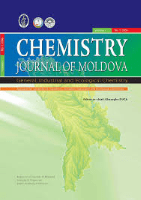
Chemistry Journal of Moldova
Pioneering Discoveries: Unveiling the Future of ChemistryChemistry Journal of Moldova is a pioneering open-access journal dedicated to fostering the dissemination of significant research in the diverse fields of chemistry, including Environmental Chemistry, Process Chemistry and Technology, and more. Published by the esteemed Academia Sciences Moldova, Institute of Chemistry, this journal has been at the forefront of scientific inquiry since its establishment in 2006. With an ISSN of 1857-1727 and a digital presence through its E-ISSN of 2345-1688, it provides an accessible platform for researchers, students, and professionals to share and engage with cutting-edge findings. Although currently ranked in the Q4 quartile in several chemistry categories, the journal is committed to improving its impact within the academic community and aims to highlight emerging trends and technologies in the chemistry domain. The journal's office is located at 3 Academiei Str, Chisinau MD-2028, Moldova. As it converges its publication years from 2016 to 2024, the Chemistry Journal of Moldova invites all contributors and readers to explore its rich repository of research that bridges innovative ideas to practical applications.
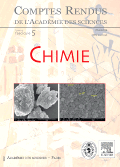
COMPTES RENDUS CHIMIE
Connecting Ideas, Inspiring Discoveries in Chemistry.COMPTES RENDUS CHIMIE, published by the prestigious Académie des Sciences in France, stands as a significant journal in the fields of chemistry and chemical engineering. With an ISSN of 1631-0748 and an E-ISSN of 1878-1543, this open-access journal has been committed to disseminating high-quality research since its transition to open access in 2020. Featuring a diverse array of studies, the journal covers innovative research trends and applications, while maintaining a Q3 category ranking in both Chemical Engineering (miscellaneous) and Chemistry (miscellaneous) as of 2023. Its Scopus rankings, positioning at #251 out of 408 in general chemistry and #169 out of 273 in general chemical engineering, highlight its growing impact within the scientific community. Authored by a global cohort of scientists and researchers, COMPTES RENDUS CHIMIE is dedicated to the advancement of knowledge and sharing insights that are vital for ongoing research and development in the chemical sciences. Located in the heart of Paris at 23 Quai de Conti, 75006, France, the journal is an essential resource for those passionate about chemistry and engineering disciplines, fostering collaboration and innovation across the world.
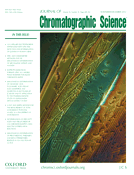
JOURNAL OF CHROMATOGRAPHIC SCIENCE
Pioneering Insights in Analytical Chemistry and MedicineWelcome to the Journal of Chromatographic Science, a premier publication dedicated to advancing the scientific understanding of chromatographic techniques and their applications across various disciplines. Published by Oxford University Press Inc, this journal, with its ISSN 0021-9665 and E-ISSN 1945-239X, has been disseminating innovative research since 1963, serving as a vital resource for researchers, industry professionals, and academic scholars in the fields of Analytical Chemistry and Medicine. As evidenced by its 2023 Scopus ranking, the journal stands at the Q3 quartile in both its primary disciplines, highlighting its relevance and contribution to ongoing research. The journal promotes high-quality, peer-reviewed articles that aim to foster knowledge and encourage the practical application of chromatographic science. While it operates under a traditional subscription model, the valuable insights it offers are essential for those seeking to enhance their expertise and stay at the forefront of chromatographic methodologies. Join our community of scholars as we explore the complexities and innovations in chromatographic science, paving the way for future discoveries.
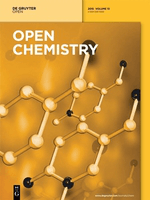
Open Chemistry
Catalyzing Progress in Chemistry and Materials ScienceOpen Chemistry, published by DE GRUYTER POLAND SP Z O O, is a distinguished peer-reviewed journal that has been serving the global chemistry community since its inception. With an ISSN of 2391-5420 and an E-ISSN also of 2391-5420, this open-access journal has been accessible to researchers and practitioners alike since 2015, ensuring a wide dissemination of high-quality research findings. Located in Germany, specifically at BOGUMILA ZUGA 32A STR, 01-811 WARSAW, MAZOVIA, POLAND, Open Chemistry aims to publish innovative research across various chemical disciplines, with special attention to miscellaneous chemistry and materials chemistry. It is currently ranked in the Q3 category for both fields as of 2023, reflecting its solid standing within the academic community, with specific ranks of 187/408 in General Chemistry and 153/317 in Materials Chemistry, corresponding to respective percentiles of 54 and 51. Open Chemistry not only enhances the accessibility of cutting-edge research but also serves as a vital resource for students, professionals, and scholars seeking to advance their knowledge in the rapidly evolving landscape of chemical sciences.

REVUE ROUMAINE DE CHIMIE
Exploring New Frontiers in Chemical ScienceREVUE ROUMAINE DE CHIMIE is a distinguished academic journal in the field of chemistry, published by EDITURA ACAD ROMANE in Romania. With an ISSN of 0035-3930, this journal has been a valuable platform for disseminating original research and insights in the diverse realm of chemistry since its inception. The journal currently operates under a competitive tier, categorized in Q4 for miscellaneous chemistry fields, as reflected in its Scopus ranking of #348 out of 408, placing it within the 14th percentile. Aiming to foster scientific discourse and innovation, the REVUE ROUMAINE DE CHIMIE provides a repository of knowledge that is crucial for researchers, professionals, and students eager to advance their understanding and contribute to the global chemistry community. By bridging local and international research initiatives, this journal plays an essential role in enhancing the visibility of Romanian scientific contributions on the world stage.
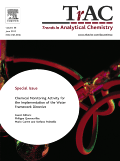
TRAC-TRENDS IN ANALYTICAL CHEMISTRY
Connecting Researchers for a Brighter Analytical FutureTRAC - Trends in Analytical Chemistry is a prestigious journal published by Elsevier Science Ltd, situated in the Netherlands. With an impressive impact factor reflected in its Q1 rankings across three major categories—Analytical Chemistry, Environmental Chemistry, and Spectroscopy—this journal stands at the forefront of disseminating pioneering research and advancements in the field of analytical chemistry. Established in 1981, TRAC provides a comprehensive platform for researchers to share influential studies and insights related to the latest trends, methodologies, and technologies in analytical techniques. Recognized globally, the journal excels in fostering cross-disciplinary dialogue and innovation, making it an indispensable resource for academics, professionals, and students alike. Explore the latest issues to stay abreast of cutting-edge developments that shape the analytical sciences.
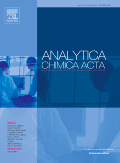
Analytica Chimica Acta
Empowering discoveries through innovative research.Analytica Chimica Acta is a prestigious peer-reviewed journal published by ELSEVIER, renowned for its significant contribution to the fields of analytical chemistry, biochemistry, environmental chemistry, and spectroscopy. Established in 1947, this journal has solidified its reputation, reflected in its impressive impact factors and Scopus rankings, including a Q1 classification in Analytical Chemistry and Spectroscopy, and a Q2 ranking in both Biochemistry and Environmental Chemistry. With its comprehensive scope, Analytica Chimica Acta aims to publish innovative research, critical reviews, and technical notes that advance the understanding and application of analytical methods. As an essential resource for researchers, professionals, and students alike, it encourages the dissemination of high-quality research that addresses contemporary challenges in chemical analysis and promotes interdisciplinary collaboration. While the journal operates primarily on a subscription basis, it also offers unique opportunities for authors to reach a broad audience and engage in the global scientific discourse.